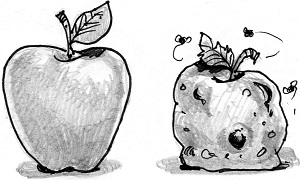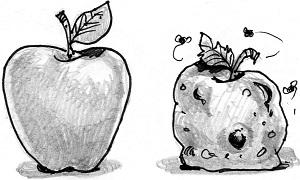

“By their fruits you will know them” (Matthew 7:16).
Gen 15:1-12, 17-18; Matt 7:15-20
One of the more troubling aspects of our national and political life is that so many people and things are not what they appear to be or say they are. Political personas are created by marketing firms that research public opinion polls to fashion candidates based on favorability ratings. Public figures mouth carefully crafted statements that straddle and smother issues with bland but high-sounding rhetoric. One veteran television journalist told viewers to turn the sound off when some public figures were speaking: “Don’t listen to what they say, just watch what they do.”
Jesus was no stranger to smooth-talking liars and hypocrites, and he offered his disciples the common wisdom: “By their fruits you will know them.” When all the polling and branding and crafting of a public figure is complete, ignore it and see what the person does. Good or bad outcomes reflect the source. Good trees produce good fruit; rotten trees produce bad fruit. A corrupt leader will infect those around him or her. They set the standard and signal expectations for what is promoted or permitted. A leader with integrity will do the opposite.
Jesus knew that it often took time to detect underlying values. Leaven permeated every part of a batch of flour as an invisible, odorless enzyme, expanding and altering the other ingredients. But depending on its quality, it could either raise or spoil the dough. He warns his disciples to beware the leaven of the Pharisees. Their hypocrisy was contagious. A corrupt culture at the top in a company little by little claims the consciences of its employees until they can no long tell the difference between ethical and unethical. St. Paul says the old leaven must be replaced by the “new leaven of sincerity and truth” (1 Cor 5:8). In his missionary journeys he encountered many “wolves in sheep’s clothing” within the community who did more damage to the church than outright enemies.
Jesus used many images to teach discernment. Tares sown among the wheat look like wheat, but they crowd out the crop, intertwining roots and damaging the harvest and the soil. It takes patience and wisdom to sort out influences, but the best way is to look at the results. Who and what produces trust, goodness and peace in the community? Often it is those who quietly and consistently build up others with encouragement and good example. Turn off the volume and watch what people do.
The metaphors in Jesus’ simple parables act like leaven and seeds in our imaginations that will eventually produce fruit -- values and actions that reveal our goodness. Cultivating the Word of God is the best way to dispel and replace the negative images and desires that can also take root in us if we let them.
Advertisement








